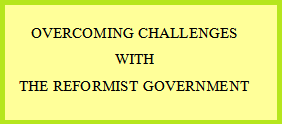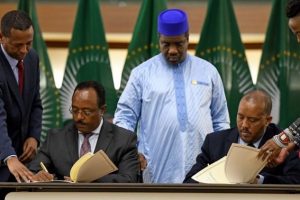BY MENGESAH AMARE
Citizens of this great nation—Ethiopia—have been well known for their peaceful-coexistence as they have been living in a very harmonious way entertaining unity, fraternity and a long-lasting amicable relationship.
No one argues about the term peaceful co-existence if it is literally given a meaning “it is the repudiation of disputes and confrontations for each and every minor reasons and amicably addressing controversial issues as much as possible with no interference of third party.”
Peaceful coexistence presumes an obligation to abstain from every form of violation of the societal integrity and violating the rights of others. It further infers abandonment of prying in the internal affairs of other countries if taken at a broader scope.
Yes, in the presence of coexistence, any social, economic and political relations must be put on a basis of complete equality, fair treatment and mutual benefit.
What we have so far observed between the Oromo and Somali nationals, the Afar and Oromo ones, the Sidama and Wolaita, Amhara and Tigraways can be the best school to reap important lessons.
All these relationships have showcased the benefits of the respective nations, nationalities and peoples of Ethiopia might reap by declaring unity in diversity.
The ways that helped citizens at all regional states have largely been resulted from political considerations and leaders’ commitment to build a unified country.
Unfortunately, the Tigray people’s Liberation Front-led (TPLF) administration allegedly abetted attacks against one another, orchestrated conspiracies, and even assisted cross boundary misadventures.
Surprisingly, the administration through its mysterious cadets has gone between the confronted people or border sharing regions to strengthen its image as a stabilizing force and defender of the rights of some groups. Many have been tricked until the truth was revealed for them.
It has been in that way all arranged clashes and confrontations have been persisted across the nation. Since the coming of Dr. Abiy to power, the policies and strategies that have contributed to the instability occurred in different parts of the country have remained unchanged. To the surprise of everyone, some state security forces have also continued to fan the flames of sectarian violence.
In some cases, like the Somali state the 2018 massacre of innocent civilians, the Irreecha attack at Bishoftu town, to mention but a few, government forces have assumed a direct role in fueling armed factional conflict.
In clear terms, the TPLF administration has sown disunity among its people. Obviously, they were right for an administration facing many pressing equality, economic and political challenges, this disunity is a convenient tool helping divert public attention from being nagged by all querying freedom, justice and democracy to thinking one on another leaving questions that have to be forwarded to the government aside.
Peaceful coexistence and religious moderation have been far more common than extremism or sectarian conflict. When the reform began, however, the government’s attitude toward sectarianism changed.
As the conflict became more violent, some members of the armed opposition also began depicting the struggle as primarily religious in nature.
Individuals and groups, who had suffered economically under the TPLF regime had fueled the reform and wholeheartedly supported the transformation actors. As months and years passed by, their hopes for an economic or a political relief swelled.
Contestant parties’ members residing abroad and some armed opposition groups started coming home to peacefully fighting for democracy and preaching their fans and esteemed members to sustain the previous peaceful coexistence and fraternity.
“The progresses following the reform in Ethiopia are a prime example of how tolerant societies are warped when religion is used as a divisive tool. All citizens have now well understood that acknowledging religious differences does not necessarily lead, however, to divisiveness and conflict,” said Amhara State Chief at a fraternity conference organized in Bahir Dar town.
He further said that differences are societal spices. All citizens have started to know that respecting one another and developing peaceful coexistence are the markers of a pluralistic society and the building blocks of any democracy.
These days, especially after the conclusion of the law enforcement operation in Tigray, every citizen across the nation, with the exception of some minor disagreements, has enjoyed freedom and breathes a sigh of relief, he added.
The effort of three states in Ethiopia, the Somali, Afar and Gambella states have long been in a stable and amicable way of living since the aftermath of the reform via consolidating peaceful coexistence among nations, nationalities and people.
Yes, leadership matters. The best experiences of the three regions have to be well duplicated and should or can be well nurtured to embody appreciation and respect for diversity within politically inclusive societies.
Coming out of various clans or tribes, religious differences as well as holding varied ideologies are manifestations of communal beauty. True, plurality must not be used as tools for furthering partisan political goals that fracture national unity as they are common and inevitable which could hardly disappear so long as human beings exist, too.
According to Agegnehu, although the ruling party reaped some benefits from disintegration and confrontation, the aggregate balance had become negative. The burden of the negative balance is passed on to the mass and Ethiopia has still incurred an immeasurable cost.
Ensuring lasting peace, it is necessary and an unsurpassed avenue to transform the present social and economic basis of the existing political system, the brain child of the reform.
Vividly, the idea of war and the disintegration conspiracy will disappear by forming a national federation of citizens throughout the country.
In clear terms, cultivating public awareness about the significance of peaceful coexistence and fraternity for which all citizens have already known, of course, is of significantly useful in building a prosperous nation and citizens shaped with amicable stance.
Hence, all need to be told to erase the spirit of hatred sowed in their mind, as this approach is of supreme importance in building a stable, inviting and well affluent nation.
In so doing, it is possible to trek a step toward mitigating tensions though entirely eliminating them is not an overnight process.
Yes, there are significant forces, even today, pushing for peace and cooperation thereby fortifying peaceful coexistence among all citizens of the nation.
The time-tested fraternity and partnership citizens’ across the nation have developed with one another since long back has to be well cemented than ever to help Ethiopia seize the ladder of success and confidently step to the next level of success.
Agegnehu called on all regional states to step up exchanging ideas, replicating best practices between/among leaders, government departments and ruling parties, support each other on major issues that concern respective core interests, enhance coordination on national and regional affairs and expand cooperation.
The federal government has been supporting competent and reliable enterprises to invest in different parts of the nation, for instance, in the projects embraced under ‘Dine for Ethiopia,’ initiative, with a view to mutually benefiting out of cooperation in investment, fishery infrastructure construction, mineral resources exploration, among others, he added.
He also suggested that all states should step up exchanges in tourism, practice sharing, cultural integration, education, public health etc.
Such a positive move would make all states ready to cement cooperation and enhance mutual understanding through youth and education interactions.
The Ethiopian Herald February 5/2013



